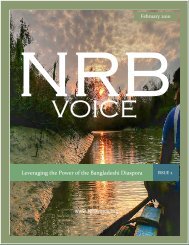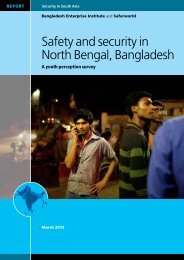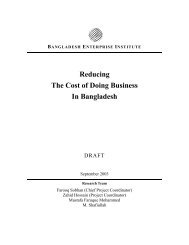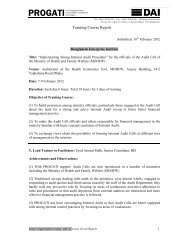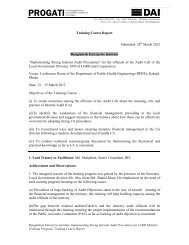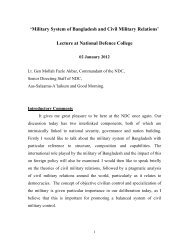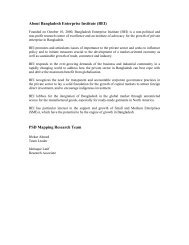Bangladesh Social Enterprise Project - Bangladesh Enterprise Institute
Bangladesh Social Enterprise Project - Bangladesh Enterprise Institute
Bangladesh Social Enterprise Project - Bangladesh Enterprise Institute
You also want an ePaper? Increase the reach of your titles
YUMPU automatically turns print PDFs into web optimized ePapers that Google loves.
“Create a Harmonious Work Environment for<br />
Women and Implement Child Care Programs”<br />
“Phulki” meaning “spark” in Bengali is a non-profit organization, established in 1991, works to<br />
improve the living conditions of working women, with special focus on child rights and women<br />
empowerment. It envisages a future where children can grow in an environment that is not only secure<br />
and healthy but also enables them to build a future with proper education. Phulki's mission is to<br />
create a world where working women do not have to sacrifice their children's well-being in order to<br />
achieve economic emancipation. Phulki has also been recognized and rewarded by the Schwab<br />
Foundation as an outstanding social entrepreneur.<br />
Phulki provides complete childcare program for children aged 6 weeks<br />
to 5 years, prior to their enrollment in primary schools, with an aim to<br />
aid working mothers who are unable to give the required time and care.<br />
The childcare service program provides both work-based and<br />
community based child care centers. As its capacity building initiative,<br />
Phulki provides training on early childhood care and does advocacy<br />
work on the issue as well.<br />
Phulki also aims at developing a community level mechanism that will<br />
help develop best practices to reduce violence against domestic girl<br />
workers. The project started with building awareness, leading to<br />
developing preventive measure in consultation with employing<br />
households, parents, local leaders, and the children themselves.<br />
Phulki was the first to implement the Child-to-Child (CTC) Approach in <strong>Bangladesh</strong>, in 1993. It is an<br />
innovative educational methodology through which children learn by themselves to work together and<br />
help each other. It is pertinent in creating awareness, promoting positive behavioral practices and in<br />
changing harmful traditional practices, be it related to hygiene or child rights. Phulki is at present,<br />
providing training on CTC to 250 child leaders and 2500 friends.<br />
Phulki has now taken on a wide consultancy role ensuring that middle managers stick to the principles<br />
of the Factory Act and their buyers. Now more companies are including Child Care Centers (crèches)<br />
within their code of conduct and changing their policy on child care especially in garments sector. In<br />
total 10,061 children from Phulkis child care, have been admitted to local primary schools. Phulki has<br />
also ensured those within the child leader's communities have access to tube wells and water points,<br />
communal latrines and systematic garbage collection & disposal.<br />
Phulki Training centres have worked in entrusting and empowering local women with the latest<br />
methods in child development to ensure high quality of care in the future. The new non-formal skilled<br />
group trained by Phulki is able to sustain their own care facilities and spread the spark further.<br />
Source: www.phulki.org<br />
Data Source: Secondary Literature<br />
Information Compiled by <strong>Bangladesh</strong> <strong>Enterprise</strong> <strong>Institute</strong> (BEI). For further information, please contact Mr. Md. Rashedur<br />
Rahman, Research Associate, BEI; Tel: +88 02 9892662-3 Ext: 120; Cell: +88 01712 193400; Email: rashed@bei-bd.org;<br />
Weblink: www.bei-bd.org



